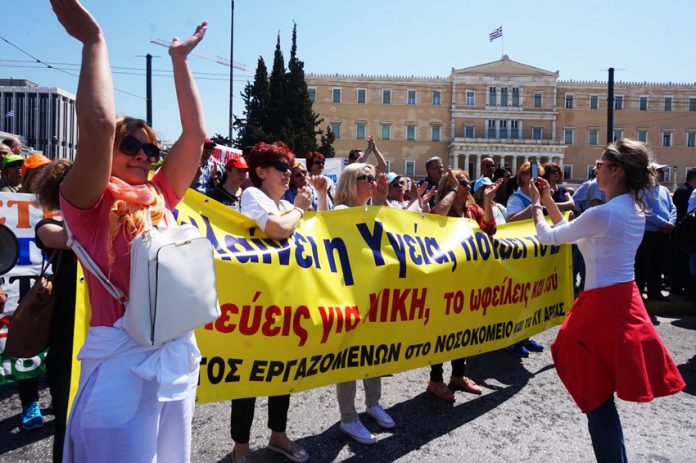
THOUSANDS of striking electricity, industrial and hospital workers met up with protesting pensioners in the streets of Athens last Wednesday, as they all marched to the Vouli (Greek parliament) demanding no privatisations, no sackings and no cuts in pensions. Inside the Vouli, the Tsipras coalition government’s deputies voted for the privatisation of four lignite coal power stations and adjacent mines in southern and northern Greece.
The DEH – State Electricity Board workers were in a national 100%-solid strike against privatisation.
But as soon as the vote for privatisation was taken in the Vouli, the electricity workers trade union federation GENOP leaders called the strike off despite vows over the last few days that the strike would continue for as long as it takes. This is yet another betrayal of a solid workers’ struggle by the reformist trade union leaders. This is typical of the Greek trade union bureaucracy in the years of savage austerity imposed by successive governments on the orders of the European Union and the IMF.
On Wednesday, the striking DEH electricity workers besieged the Vouli throwing lignite in front of the building and attempted to enter the grounds. They were stopped by the armed riot police.
Stefanos, a DEH worker from Megalopolis southern Greece, held a union banner on the march stating that hundreds of workers in his region are employed on ‘short-contracts’ terms for just eight months at a time on cheap labour wages of 500-700 euros (approx. £270-380). This, Stefanos said, has been accepted by GENOP and has resulted in friction between young and older workers as well as with female and male workers.
This is also true of state hospitals who employ thousands of nurses, doctors and other staff on short-contracts. The state hospitals workers federation POEDIN called a 24-hour strike on Wednesday, but only a five-hour stoppage in Athens, calling on the government to offer permanent contracts on all those on short-contracts who are in line to be sacked en masse. POEDIN, and other trade union federation leaders, organise such actions as just protests, ‘blank shots to the sky’ as workers put it. At the end of Wednesday’s march in Athens POEDIN leaders met up with the Greek Health Minister to complain.
The Greek pensioners’ unions organised yet another rally and march in Athens last Wednesday against the continuous cuts to their pensions. As a result of an EU-IMF demand, workers who first received pensions pre-2016, will have their pension cut by 18% on 1st January 2019. The majority of Greek pensioners receive an average of 500 euros a month (£270). LARCO workers were also on the Athens march last Wednesday against privatisation and demanding proper contracts for all workers. LARCO, a huge state metal and mines enterprise, is the largest such company in Greece. On EU-IMF diktats, the Alexis Tsipras coalition government aims to divide the company and sell its parts, similar to the government policy for DEH.
As in France so in Greece, there is fierce and determined resistance by the workers to the Tsipras government’s barbaric austerity. This fight has been time and again stabbed in the back by the treacherous reformist trade union leaders. It is clear and necessary that workers have to develop a new leadership to fight the Tsipras government and the EU-IMF austerity accords to the end.
Meanwhile, Greece has refused to exchange the eight Turkish officers who landed in 2016 for the two young Greek soldiers who have been detained in Turkey since early March this year. A third motion filed by attorneys representing the two Greek soldiers, being held in pre-trial detention in a Turkish border city, has been rejected, according to media reports on Wednesday.
The two men, a lieutenant and a NCO, have been held for 55 days in an Edirne prison on preliminary charges of entering a restricted military zone in Turkey. The pair allegedly strayed into Turkish territory on March 1st along a poorly demarcated spot along a stretch of the Greek-Turkish land border. Most of the frontier separating the two countries in the Thrace province is delineated by the Evros (Maritsa) River.
The preliminary nature of the charge against the men, and the reason cited for their incarceration, has still not yielded a specific indictment, nor has a court date been set.
The incident has acquired international dimensions, with top European leaders broaching the matter with the Turkish leadership and with the European Parliament issuing a resolution demanding the case be quickly resolved.
The Greek political leadership, both the government and the opposition, also flatly reject any attempt to link the two men’s fate with Turkish president Reccep Erdogan’s demand for the extradition of eight Turkish military personnel he claims participated in the failed July 2016 coup attempt in the neighbouring country and then fled to Greece. The eight Turks have filed for political asylum.
One of the eight Turkish officers who fled to Greece in a military helicopter on the night of the failed coup attempt in Turkey on July 15, 2016, was set free yesterday on the order of the Council of State (CoS), Greece’s supreme judicial. Suleyman Ozkaynakci was the co-pilot of the helicopter that landed in the northern Greek city of Alexandroupolis. The eight military personnel escaped to Greece and requested political asylum fearing they would be persecuted by the authorities as accomplices in the overthrow of the Turkish government. According to the ruling by the CoS, the Turkish officer will be set free under strict conditions.
The CoS Plenary session presided over by Nikos Sakelariou and Diomidis Kyrillopoulos as the rapporteur judged the Greek government should allow the Turkish officer to be freed provided: a) he is not issued with travel documents; b) he has a specified non-disclosed residency, and; c) be compelled to make a show at his local police precinct every day. The other seven Turkish officers remain in custody at the Olympic village police precinct, as they have yet to be granted asylum.